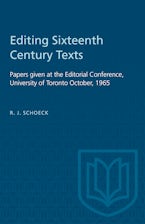Early in 1965 a group of scholars in the University of Toronto conceived the idea of a continuing conference on editorial problems at which scholars actively at work upon editorial tasks could come together for a free discussion of their work, learning from each other's experience, pooling their common intellectual resources, and seeking out expert opinion and counsel. This volume contains most of the papers presented at the first conference, held in October 1965, in St. Michael's College and University College in the University of Toronto, focusing on the editing of sixteenth-century texts. Among those who attended the Conference were scholars from such diverse disciplines as English and French literatures, Islamic studies, history, bibliography, drama, and others. The papers presented represent varying approaches to editing, but all reflect a sense of dedication of the editor.
The first two papers in this volume firmly stress dramatic and poetic editing, and place English and French side by side from the point of view of the modern editor, with many ideas a possibilities thrown out for the beginning scholar. The next two, concentrating on Erasmus and More, introduce humanistic concerns, and chart some of the problems of sixteenth-century editors and translators themselves. In the final two essays, newer ground is broken, first in the study of a publisher in Lyon, with its new documentation of the economics and sociology of sixteenth-century publishing, and its intriguing material on international book trade; the final essay discusses the Frankfurt Book Fair, and the publication of Zeitungen. Richard J. Schoeck has contributed an Introduction from which the following remarks are taken. "‘By common consent the constitution of an author's text is the highest aim that a scholar can set before himself: this is the dictum, R.C. Bald has stressed, of a classical scholar, 'and a classical scholar is far more acutely conscious than a student of the modern literatures that for over two thousand years the preservation and elucidation of the texts of the great writers has been the primary concern of literary study.' To the novice, there may be an 'exquisite tedium' in the work of an editor; but the experienced scholar will know that the role of an editor is always at least 'the fastidious one of entremetteur' and to the dedicated the words of John Burnet above will not seem too extravagant."
By bringing together the views of experiences of a distinguished group of scholars on editorial approaches to a variety of material this volume will provide valuable background for anyone interested in the editing of texts.

